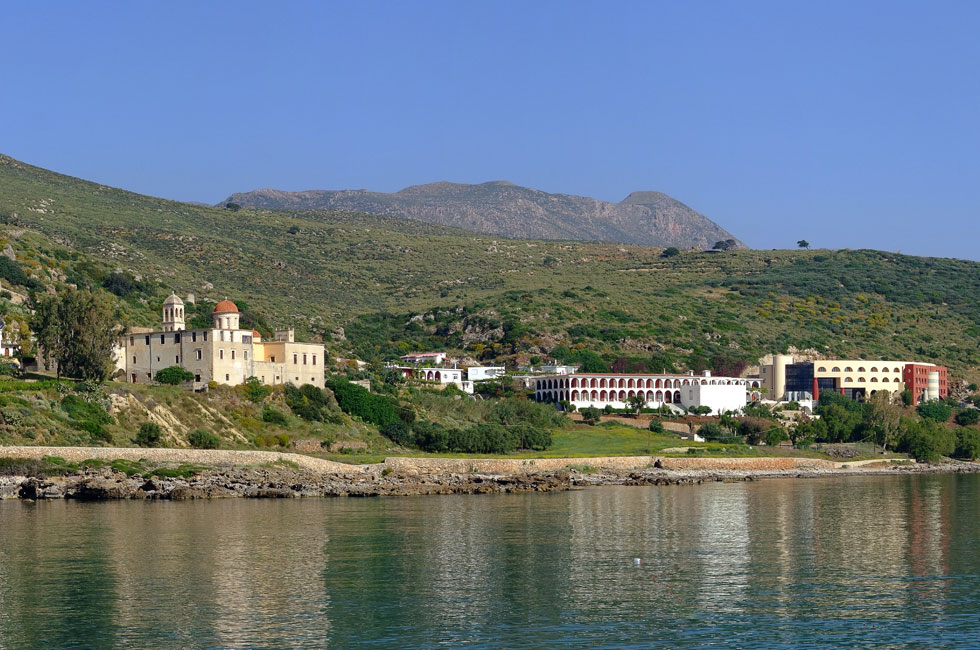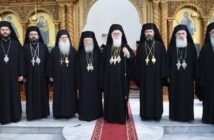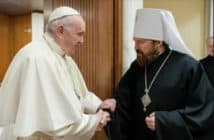Source: First Things
by Cyril Hovorun
Originally published on July 7, 2016

I had begun writing about the results of the Pan-Orthodox Council, which recently finished its work in Crete, before it was actually convened. The working title I chose then was “Pentecost 2016: A Doomsday for the Orthodox.” At the time, I was desperate about the Council and its outcome, along with many other Orthodox, who were shocked that four of the fourteen Orthodox churches had decided at the last minute not to go to Crete. There seemed no reason to hope that a “Vatican-II effect” would occur at this Council. (That is when a conciliar event, strictly pre-programmed by church bureaucrats to prevent surprises, suddenly turns into something unpredictable, a true manifestation of the Church.) But by the end of the Council, it was clear that a Vatican-II effect had developed at Crete, albeit partially.
The Council at Crete had to address a number of challenges faced by global Orthodoxy. Moreover, the Council itself had become a challenge for global Orthodoxy. Instead of being a triumphant manifestation of Orthodox unity, as it was meant to be, its inauspicious beginnings promised shameful disunity. What eventually developed was a true conciliar event—but even then, a different picture of conciliarity emerged than most people had expected. That picture is not triumphalist. Not all challenges were met with success. In some respects, the Council failed. In other respects, the miracle of conciliarity transformed challenges into opportunities.
As I wrote above, the Council per se had become a challenge—a challenge primarily for Orthodox identity. The era of confessionalization affected not only the branches of Western Christianity, but the Christian East as well, as the Orthodox were forced to identify themselves vis-à-vis Catholics and Protestants. We picked up “conciliarity” as a particular confessional mark. We still counterpose it to both the Catholic papal system and Protestant fragmentation. In Catholic-Orthodox dialogues, we always advocate conciliarity in counterweight to primacy. In our dialogues with Protestant confessions, we emphasize that to have valid councils, a church must have apostolic succession and other structures that go back to the apostolic age.
Thus, the inability of all our local churches to come together in Crete has hurt our self-image as Orthodox. What are we if we cannot meet together? After Crete, this question remains difficult to answer. Nevertheless, there is hope in this humbling fact. If conciliarity mattered to us less, more churches would have been absent. Many—not all—showed strength in overcoming their disagreements and hesitations, precisely to demonstrate that conciliarity is important for Orthodox identity.
As for those disagreements and hesitations: Almost all Orthodox churches have disputes with their neighbors. Since the nineteenth century, the Orthodox have embraced the political idea of territorial sovereignty. From this perspective, churches that trespass on the “canonical territory” of other churches are treated as aggressor states. As a result, some Orthodox churches are at war with each other, and they viewed the Council as an opportunity to resolve their quarrels. They used their participation to blackmail the other churches: We will not go to the Council unless Church X stops stepping into our territory. Conciliarity, thus, became a sort of intra-Orthodox currency, with which the churches tried to buy solutions for local issues.
This has been particularly the case with the Church of Antioch, which argues with the Church of Jerusalem over an Orthodox community in Qatar. The Patriarch of Antioch refused to attend the preconciliar meetings of the primates and the Council itself, as long as the Patriarch of Jerusalem was there. This was the most embarrassing and damaging episode. Other churches, which have even more severe disagreements, resisted the temptation to settle their local problems at the expense of the Council. This was the case, for instance, with the Serbian Church, which has an unsettled dispute with the Romanian Church. The Serbian Church initially decided not to go to Crete, but later changed its mind.
Other churches, to solve their internal issues, attempted to abandon the Council for an endless conciliar process. For instance, many Ukrainian Orthodox seek independence from the Russian Church—and the Russian Church feared that the Council might resolve this issue in the Ukrainian Church’s favor. As long as the conciliar process continued, the Russian Church reasoned, the issue would remain unresolved and the status quo would be maintained. Therefore, the Russian Church insisted that the Council was premature and advised that the preparatory process should continue. This was an easy idea to sell to other churches. The process of preparation for the Council had lasted for over fifty years—so long that it almost seemed to take the place of the Council as such. So the Russian Church argued: What’s the hurry? We should take some more years and make the Council perfect.
This proposal would have granted the Council a very limited mission: to sign what had already been agreed upon in the process of preparing for the Council. This attitude recalls the famous saying of former speaker of the Russian Parliament Boris Gryzlov: “Parliament is not a place for discussions.” All of the Council’s decisions would have to be prearranged. But the Council managed to avoid this trap. It became “a place for discussions,” some of them rather heated. The scope of the discussions may have been narrow, confined to the thematology that had survived the long process of preparation. Still, the Council became an unpredictable event, with the results of the discussions depending not on prearrangements but on the argumentation of the sides involved. This made it truly an ecclesial council, rather than a “congress of the Communist Party of the Soviet Union.”
The drafts of the documents prepared for discussion were imperfect—as was pointed out by several churches that claimed the documents as their reason for not attending the Council. As a matter of fact, no one much liked the quality of these documents, though the churches that attended the Council were able to improve them through discussion. In any case, the churches should blame themselves if the documents were unsatisfactory. All the documents had been drafted over the course of decades by bureaucrats appointed by the churches. These bureaucrats did their drafting job and then reported to their synods. The synods were supposed to scrutinize the documents and accept or reject the drafts. In reality, however, few read the texts. After formal approval, they were sent to collect dust in the archives. When the synods dusted off the texts and read them for the first time, they were surprised how unsatisfactory they were. The Council was put at risk, then, because the synods had not done their homework until the last minute.
The Council was only partially successful in addressing the issue of solidarity. In its final statements, the Council expressed sympathy for refugees and for those who suffer in the Middle East. However, it kept silent on an ongoing conflict that is much closer to the Orthodox: the one in Ukraine. Only once in the encyclical letter did a reference appear to “the troubled country of Ukraine.” More words were uttered by the Council in support of two bishops kidnapped in Syria than for thousands of Orthodox killed in Ukraine. The two wars in Europe in the twenty-first century have been between Orthodox countries: Russia and Georgia in 2008, and Russia and Ukraine from 2014. One would expect the Orthodox churches, at their unique venue, to address both wars. Unfortunately, the Council only condemned war in general, without acknowledging any Orthodox responsibility for two particular conflicts.
Despite this and other failures, it is worth emphasizing that the participants of the Pan-Orthodox Council have lived through an experience that no member of the Orthodox Church has for centuries. The Council at Crete turned out to be different from what both optimists and pessimists had expected. It did not resemble any icon of the Ecumenical Councils that we usually imagine. It was a council with a lot of pain and anxiety, before and during the event. But were the Ecumenical Councils not the same to their participants, who did not yet know that they would be of any historical importance for the Church?
The Council at Crete was a true conciliar event. Now that it is over, pain and anxiety have given way to hope that Orthodoxy can overcome its partisanship and paralysis. The Council revealed not so much the doxa of Orthodoxy, as its real condition. Modern Orthodoxy is complicated. It is challenged and challenging. The Council allows us to realize more adequately what we are as Orthodox. We understand our limitations, but we also see the way to overcome them. The Council will make us humbler in our relations with our non-Orthodox Christian brothers, but it has not humiliated us before them.
Cyril Hovorun is a senior lecturer at Sankt Ignatios Academy/Stockholm School of Theology in Sweden and a visiting scholar at Columbia University. He served as chairman of the department for external relations of the Ukrainian Orthodox Church and first deputy chairman of the educational committee of the Moscow Patriarchate. He is a scholar in patristics and ecclesiology. His recent book is Meta-Ecclesiology: Chronicles on Church Awareness.
Become a fan of First Things on Facebook, subscribe to First Things via RSS, and follow First Things on Twitter.



1 Comment
It really is simple. The Council in Crete failed because Istanbul failed to work with Moscow. Even going into the council, Istanbul had a pre-arranged agenda that favored itself and ignored Moscow. Of course it was going to fail! In fact, Istanbul wanted all decisions of autocephalous churches to be reviewed by itself and could nix any or all. Not a real ecumenical type council, but one where Istanbul tried to usurp power & authority, AGAIN! Oh, and regarding the Ukrainian Church, how much did they pay + Bart for recognition while ignoring Moscow?